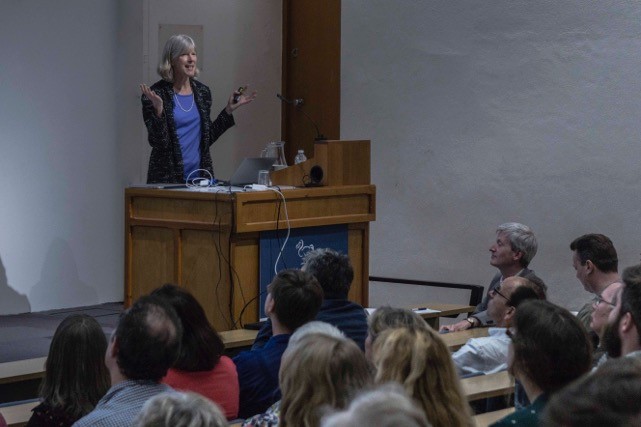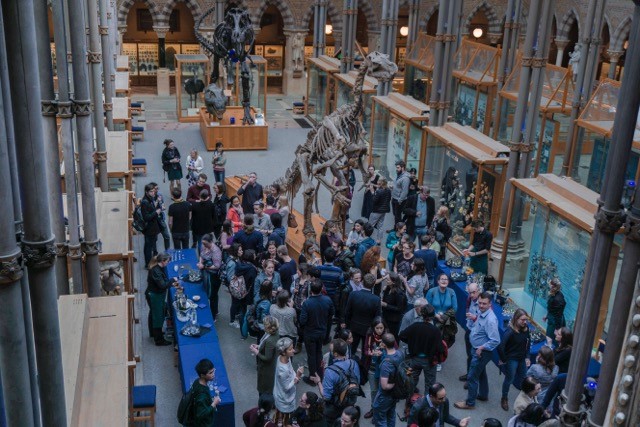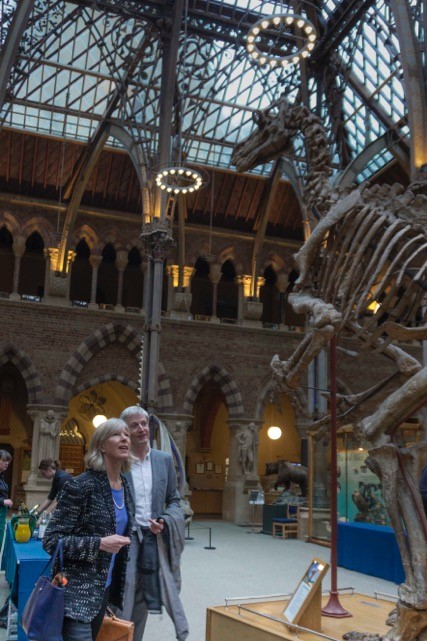Cynthia Kenyon delivers inspiring lecture in annual homage to penicillin hero Norman Heatley
To commemorate Norman Heatley’s key contributions to the discovery of penicillin, the Sir William Dunn School of Pathology organises an annual high-profile lecture featuring a world-renowned biomedical scientist. The 26th edition of the Norman Heatley lecture was celebrated on 23rd April 2018 at the Oxford University Museum of Natural History. On this occasion, over 150 attendees had the chance to hear about the exciting work from Professor Cynthia Kenyon, a C. elegans geneticist who pioneered the use of the worm in life-span research and has made several fundamental discoveries about the cellular mechanisms of ageing.
Cynthia Kenyon’s talk provided an overview of her discoveries over the years; from her ground-breaking work in the 90s of a single-gene mutation that doubles the life-span of worms, to her more recent work understanding the complex network of hormone-signalling pathways that control the ageing process in different cell types and diverse species, including flies, mice and humans. In 2014, Cynthia Kenyon was recruited from USCF (where she had been a professor since 1986) to Google-funded research and development company Calico, whose mission is to tackle human ageing and understand the biology regulating lifespan. Kenyon is currently Calico’s vice-president of ageing research and is very much involved in fundamental research as well as drug development for age-related diseases.
“Cynthia is perhaps the most prominent scientist working on the fundamental biology of ageing and longevity, so it was great that she agreed to give this year’s Norman Heatley Lecture. I’ve had fantastic feedback – people loved her combination of cutting edge cell biology and the wider vision about the future of a field that we all care about. Her work shows that the quest to extend healthy human lifespan has a real scientific basis.” said Professor Matthew Freeman, head of the Dunn School of Pathology.
Host Matthew Freeman took the opportunity, at the beginning of the lecture, to remind the audience of Norman Heatley’s work as the often-called unsung hero of the penicillin story. The development of penicillin, the first antibiotic that changed the history of biomedicine and human health, originated at the Sir William Dunn School of Pathology in 1939 with E. B. Chain and H. W. Florey. Norman Heatley, was one of their team members who made critical contributions to the discovery, yet his work in the history of penicillin is often overlooked. Heatley devised and developed the extraction method and equipment to efficiently purify penicillin in bulk. Freeman used Sir Henry Harris’ famous quote: “Without Fleming, no Chain or Florey; without Florey, no Heatley; without Heatley, no penicillin”. Freeman also highlighted the fact that two of Heatley’s daughters, Rose and Tamsin, were able to attend the event.
Prior to her lecture, Cynthia Kenyon had the chance to meet diverse group leaders working at the Dunn School and other departments of the University of Oxford. She also shared her experience as a leading biomedical scientist with students and postdocs from the department over lunch. The lecture was concluded with a drinks and canapes reception that took place around the Museum’s dinosaur collection, offering an impressive backdrop for the celebration of this year’s Heatley lecture.
The event was filmed by Voices from Oxford, who kindly produced a video of the event that will be available online soon. Visit the Voices from Oxford website to view their coverage of the 2018 Norman Heatley lecture.
To read more about the discovery of penicillin in Oxford visit: https://www.path.ox.ac.uk/content/discovery-penicillin
To read more about research in Calico visit: https://www.calicolabs.com
Written by Dr Anna Caballe (@caballe_anna)



